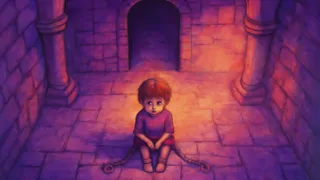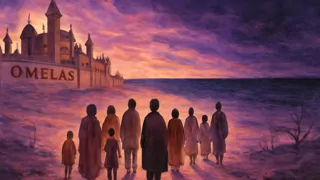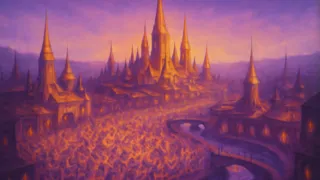Introduction
The city of Omelas was famed for its golden spires that soared against a cerulean sky, a place where children’s laughter and music wove into a tapestry of endless celebration and peace. Every year, the Festival of Lights lit its canals and streets with lanterns spun by joyous hands, and the citizens felt their hearts expand with communal pride. Merchants greeted one another warmly as banners fluttered along the cobblestone avenues, and poets recited verses that spoke of a world free from want. Yet beneath this vivid jubilation lay an unspoken understanding: the harmony of Omelas depended on a solitary truth, dark and hidden. In hushed voices, elders taught the youngest generation that prosperity was not a gift, but a choice—one that carried an inescapable burden. None spoke of the price aloud in public; it was sufficient that each soul carried the knowledge privately, a thorn in the mind stifling every unreserved moment of delight. Most accepted this quiet weight, believing it the necessary balance to bliss. A few, unable to bear the cost, slipped away under cover of night. They walked toward distant horizons, where the road twisted into uncertainty, guided only by conscience and a longing for a more honest peace.
Beneath the Golden Spires
Omelas rose from gentle hills to a broad plain where rivers split like ribbons of silver. Magnificent arches and vaulted walkways connected towers of pale stone, each carved with runes of joy and abundance. Citizens moved in effortless harmony, their footsteps echoing like music through colonnades hung with fragrant garlands. Laughter rose in distant courtyards as children chased butterflies painted with living light. Scholars gathered in open-air forums to debate the nature of kindness and the shape of future utopias, while artists adorned public fountains with mosaics depicting the human spirit at its most jubilant. Night fell as a velvet curtain pierced by lantern glow; the city never truly slept, its pulse maintained by collective wonder. Even in the quiet hours, a soft hum of contentment drifted through empty streets, carried on cool breezes that tasted faintly of jasmine and promise.

Yet not every corner of Omelas gleamed with shared joy. Beneath the marble plazas lay hidden chambers where the city’s secret was kept. A single locked doorway, unremarkable to most eyes, led to stone steps descending into a cavernous cellar. Here, in perpetual gloom, a solitary child waited. The air in this space felt thick and stagnant, and the walls bore damp stains from long-forgotten leaks. Guards stationed above moved silently, hearts heavy with both duty and sorrow. They rarely spoke of what lay below, but each knew the fundamental truth: Omelas could exist in splendor only if one life was traded for countless others. Every citizen understood the pact, and all had seen the child at least once—though few could meet its gaze without shuddering. Respect and revulsion intertwined as they turned away, hands pressed over mouths to stifle any cry of protest.
Whispers of doubt sometimes sparked among young adults poised to join the city’s ranks. They questioned whether happiness built on suffering could endure, and whether the brilliance of Omelas was itself a fragile illusion. Debates flared in secret gatherings, voices hushed but urgent. Some argued that the child’s sacrifice was the dark root from which all beauty grew, an unavoidable truth of mortal existence. Others insisted that true progress required compassion without cruelty, that a society should never condone such an exchange. Neither side prevailed; the uneasy consensus held, and festival preparations marched on.Viewers in galleries above toasted to the city’s founders, unaware of the imprisoned soul beneath their feet.
As dawn approached once more, golden light filtered down through cracks in the floor above, illuminating the child’s pale features. Damp hair clung to its forehead, and its eyes, wide with longing for freedom, met the beam. In that moment, the heart of Omelas seemed to flicker between light and shadow, a fragile balance dependent on a single breath.
The Hidden Child
In the hush before the Festival of Mirrors, when streets lay empty and only lanterns cast waiting glows, a select few were guided underground. Officials escorted them past unmarked doors, each clasp of iron ringing like a knell. They gathered around the cell, hushed and solemn. The child, no older than seven or eight, sat on a blanket frayed at the edges. Its ribs were faintly visible beneath thin skin, and its eyes tracked every movement with a blend of fear and curiosity. Visitors averted their gazes, and tears glistened in corners as the weight of their complicity settled on each heart.

A gentle voice—a philosopher entrusted with care—spoke aloud to remind them of the necessity. "This sacrifice sustains us. Without it, the spires would collapse, the rivers would dry, and anguish would overtake every soul." The words sounded rehearsed, but even the speaker’s voice broke at the final phrase. One by one, the visitors laid offerings of food and soft cloth, expressing gratitude they struggled to summon. The child reached for a loaf of fresh bread, breaking its fast in silence.
Among the watchers stood a young teacher who had once taught the city’s children to read—taught them to see beauty in words. Yet now she felt guilt twist in her veins like ice. She recalled bright classrooms and open minds, and wondered if compassion might bloom in place of fear. A tremor ran through her as she realized she would not speak. Instead, she stepped away, her footsteps echoing strangely in the corridor. Others noticed, hearts pounding. A handful followed, choosing conscience over comfort, departing into the rootless dark beyond the locked gates.
Behind them, the philosopher closed the hatch, sealing the child’s world of shadow. Voices receded, leaving only the drip of water and the soft hum of the city above. The sacrifice was complete for another year, the bargain renewed yet again.
The Choice to Depart
On festival night, the streets of Omelas swelled with visitors from distant towns, drawn by tales of unparalleled joy. Lanterns bobbed in waves as citizens and guests alike danced around fountains that spouted colored light. Music filled the air—strings, flutes, and voices entwined in melodies that spoke of freedom and unity. The sugary aroma of pastries mingled with the scent of night-blooming flowers, and every face shone with anticipation. Here, life seemed unburdened, a pure reflection of hope made real.

Yet at the edge of the celebration, a narrow road slipped beyond the city’s lantern glow into shadowed woods and uncharted hills. Those few who knew the city’s secret slipped away down that path. Their footsteps were silent at first, hearts heavy with sorrow and resolve. Each carried only what they needed: a change of garments, a small loaf of bread, and the weight of their choice. They did not speak of turning back; to do so would be to betray a conscience newly awakened.
As they pressed on beneath ancient oaks, voices dropped until only breath and the whisper of leaves remained. For some, a tremor of fear flickered—what would the world beyond hold? There were no lantern-lit streets or fountains there, no assured happiness. Only possibility: a world unshaped by hidden sins, a world where joy might come at no price but hard work and compassion.
Behind them, Omelas pulsed with light and laughter. Ahead, stars shimmered in cold clarity. A few turned once, glancing at the city that had nurtured them even as it demanded the unthinkable. Then, with steady pace, they walked away.
Conclusion
In the days that followed, tales of Omelas spread far beyond its borders: a city of beauty and celebration, yet forever bound to a hidden suffering. Those who remained told themselves they were wiser for having accepted the bargain, believing that true joy could never come without sacrifice. The few who departed carried a different story—one of moral clarity and the quest for a new kind of happiness. Whether Omelas endures or crumbles, its legacy asks each traveler what price they are willing to pay for peace. Some will choose bliss tempered by guilt, others the uncertain path of integrity. In every heart, the question lingers: can we build perfection without a shadow?



















